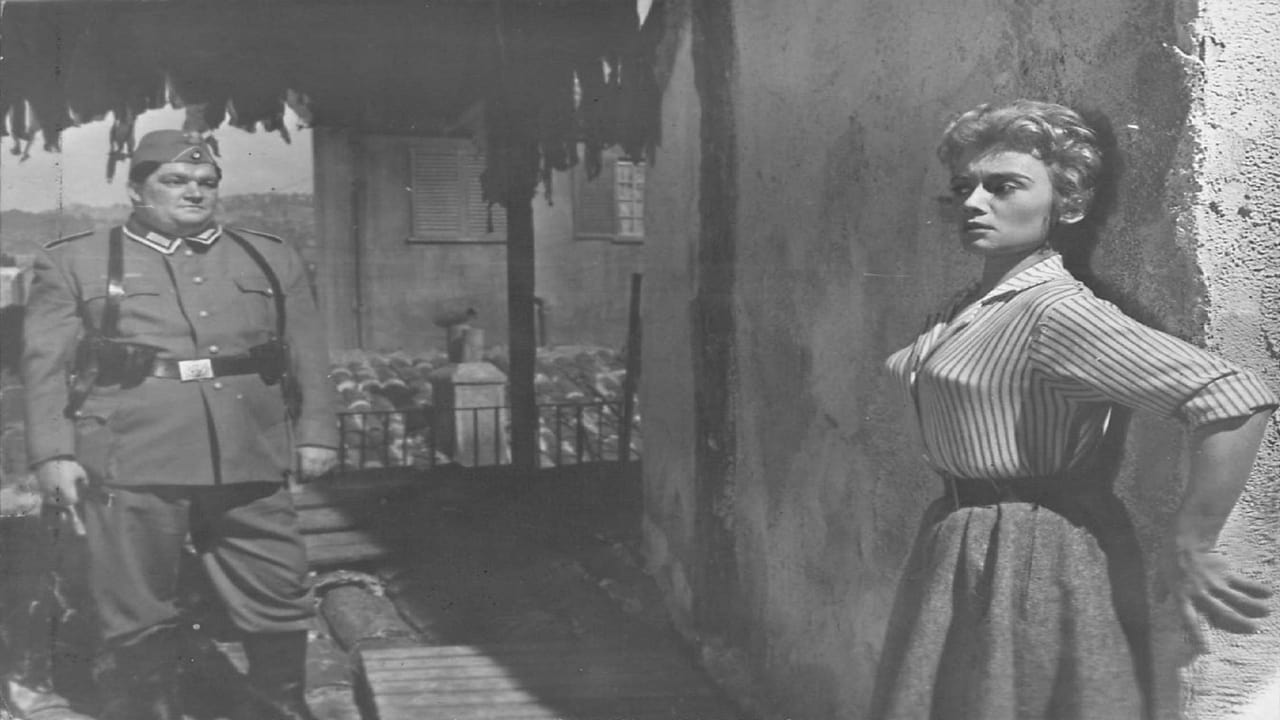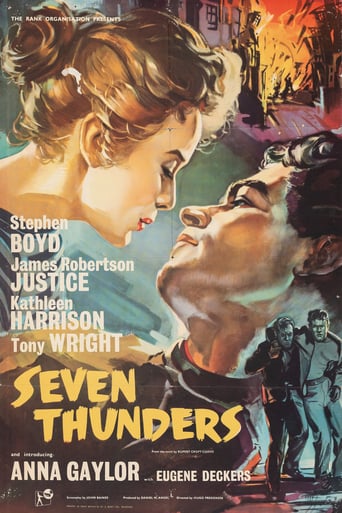robert-temple-1
This is a remarkable film based upon the horrific true events of January 1943 when the Nazis and their lapdogs the Vichy French dynamited and destroyed the entire First Arondissement of Marseilles, the area known as the Old Port of Marseilles. A great deal of real documentary footage of the buildings being blown up is incorporated into this dramatic film, so the result is terrifyingly convincing, and it reminds us of what is happening today in some of the cities of Syria. The 'seven thunders' of the original film title SEVEN THUNDERS presumably refer to the explosions, though the phrase does not occur in the film dialogue, and the title is never overtly explained on screen. This film has now been released on DVD under its original title and is no longer called THE BEASTS OF MARSEILLES. The story is based upon a novel by Rupert Croft-Cooke (1903-1979). He was a gay man who used to hang out at the Fitzroy Tavern in London's Fitzrovia, where Nina Hamnett and the other artistic and literary Bohemians were often be found in the 1950s, along with Tambimuttu and those two well-known gays, Sir John Waldron and Sir Francis Rose (my wife and I knew the last-named three but never met Hamnett or, knowingly, Croft-Cooke; Francis was Gertrude Stein's 'Rose is a Rose is a Rose', by the way, though it is surprising how few people seem to know that, imagining that she was speaking of a flower). The lead female role in this film is played by the French actress Anna Gaylor. She is by far the best thing in the film, as her charming, cheeky gamine persona lights up the screen. And that took some doing, because Stephen Boyd as the male lead is rather dull and uninspired beside her. At this time Gaylor was 25 and is still with us today, aged 79, having appeared in 121 films, and this one was only her third feature film, as her career only started the year before, in 1956. This film must have boosted her career a lot, as she is so cute she is really irresistible. Even Stephen Boyd cannot resist her, and for a block of wood, that says something. There is a weird sub-plot to this story, in which a psychotic murderer pretends to help Jews and others escape the Vichy police. He is played by James Robertson Justice with a creepy urbanity. It is his habit to offer a glass of drugged cognac to fugitives. Then they fall asleep, he takes their money, and carries them to the basement where he dissolves their bodies in quicklime. Quick lime, quick fortune. He lives in a very well-furnished house indeed, full of valuable antiquities earned from his ghastly career. He is keen to murder his 100th victim. Will he live long enough to reach his target number? He reminds me of the quiet murderer portrayed by Jules Romains in his MEN OF GOOD WILL series of novels. Such people always send a chill up one's spine, or down one's spine, depending upon temperament and whether one is standing on one's head or not. I suppose that some yogis in that position have descending rather than ascending kundalini, but Pātanjāli does not discuss that technicality. There is an odd feature to this film, however, and I must call attention to it. All the 'bad guys' who destroy the Old Port are shown as Germans in uniform. But the truth is entirely different. Try typing 'Battle of Marseille' into Google and go to that entry in Wikipedia, and you will see what I mean. (They leave the 's' off Marseilles, not sure why.) What really happened is that this was all done by the Vichy French police, who were more eager to kill Jews than the Gestapo themselves, and who grovelled on their bellies to the Nazis like the slimy worms they were. Their motto seems to have been: 'Whom can we kill for you today, can't you think of someone? Heil Hitler! Let me lick your jackboots!' Why was all of this omitted from the film and German soldiers substituted instead? The entire idea was carried out by the revolting traitor, René Bousquet, who was such a close chum of Francois Mitterand that he used to visit him for chats about the good old days after Mitterand became President of France. Mitterand, who posed as a socialist to gain power, had been a keen Vichy official working for the Nazis. No hypocrisy there, surely! 120 French police inspectors travelled from Paris to supervise the work and altogether 12,000 French police implemented the plan. 30,000 French people were forcibly evacuated from their homes, 2,000 arrested and send to the death camps, and 1,500 buildings were blown up in a single day, most of them containing the possessions of the ousted inhabitants. And all this was done by the French, willingly and enthusiastically, not by the Nazis themselves. The depths of evil, treachery, and betrayal against their fellow countrymen by the Vichy authorities laid the basis for the fantastic immorality and corruption of modern French business and politics. The French people know this, and that is why the French thrillers such as TELL NO ONE (2006, see my review) always have a corrupt politician or sinister state plot in the background. The fact is that the French people do not trust those in authority over them and have not done so since Vichy, and with good reason. After all, when you end up with a supposedly left-wing President who was really a Vichy traitor, and when you narrowly avoid having the appalling and now disgraced Strauss-Kahn as President, not to mention the most snobbish man in France, Giscard d'Estaing, also as a past President, what hope is there? But why were the Vichy French crimes suppressed in this film? That is a very good question.
LCShackley
It's 1943, and the Germans are in control of the French port of Marseilles. Although the Nazis seem to be having plenty of fun at the local bordellos, they're upset by the amount of crime in the poor part of town, and suspicious that anti-Nazi plots are hatching there. They're absolutely right. At the beginning of the film, we meet two British soldiers who escaped from a POW camp, and are hunkering down in a tiny apartment, waiting for a chance to sail to England. But they can't possibly obey orders and stay in that apartment, so they venture out, and through them we gradually meet the rest of the people in the building and the local area. There's the charming girl next door who's also a petty thief (Anna Gaylor, looking a lot like a young Jessica Lange), an ex-pat Cockney lady with a knack for self-preservation (Kathleen Harrison), a fat and vicious Nazi with an eye for the ladies, and a sinister gentleman named Dr. Martout (James Robertson Justice) who claims to be helping refugees flee the country, but may in fact be in a completely different line of work.The script skillfully weaves all these story lines together, and keeps the tension turned up throughout. Although the opening credits label this "A British FILM" shot at Pinewood, much of it is shot on location, so the city of Marseilles plays a key role. Why is this fine- looking film, with a very competent cast and arresting visuals, so little known? This is an excellent, off-beat addition to the canon of WW2 movies.
ccmiller1492
A gripping, unusual study of the people of the port of Marseilles during Nazi occupation...the supporting characters are outstanding: James Robertson Justice as a secret murderer posing as a benevolent arranger for people desperate to escape, his several victims as he works to achieve an even 100, the plucky jeune femme who does her best to "capture" the English POW (Boyd), and each person right down to the German troopers (the overweight beastly molester, and the callow and nervous trigger-happy 20 yr. who kills a child.) Every performance in this film is meticulous and authentic, and helps in building to a very tense and suspenseful outcome. And there are moments of great pathos and excitement along the way. Don't miss this one, it's a neglected gem.

